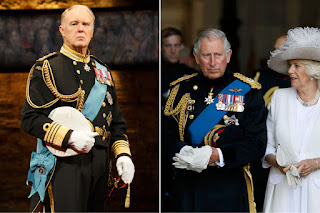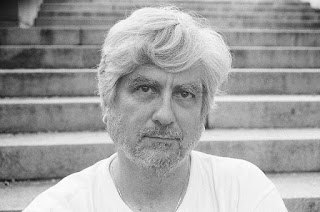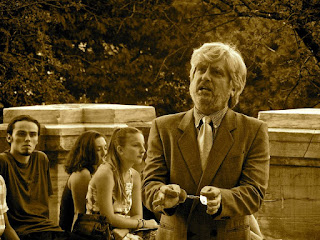I haven't written an obit/tribute in these pages since last year (when Patty Duke died, go here to read that one), but when this gent died last Friday, attention had to be paid.
Tim Pigott-Smith
 |
| 1946-2017 |
Our hero had a career spanning six decades with success on stage, screen, and television. He never stopped working, though his career had a couple of high points. One of those was very recent, as he introduced the world to one of the most admired new plays of the past few years, King Charles III.
 |
| Truth be told, there's not much physical resemblance between Pigott-Smith and the royal he portrayed in King Charles III, but everyone thought he nailed the role. He was nominated for both the Olivier (he lost to Mark Strong in View From the Bridge) and the Tony (he lost to Frank Langella in The Father). |
Written by Mike Bartlett in iambic pentameter, the piece takes place in the very near future: upon the death of Elizabeth II, the Prince of Wales finally assumes the British throne, after 70 years waiting in the wings.
 |
It was great fun to watch this fictionalized
portrait of the royal family with struggles
right out of Shakespeare and O'Neill. And
there was some great Hat Acting being
done by the actress playing Camilla. |
I saw the play in its regional theatre debut at The Shakespeare Theatre Company in DC, but I wish I had caught the original West End cast when it transferred to Broadway last year. Pigott-Smith (let's call him P-S for convenience from here on out, no disrespect intended) received rave reviews and a Tony nod for his work. He received an Olivier nomination for the performance as well, he lost them both. But his career was continuing non-stop; he has several films in the can, including a TV version of Chuck 3 scheduled to be shown on PBS in May.
 |
| P-S's contemporary work included this production of Albee's A Delicate Balance; do you recognize the woman he's playing opposite? That's Penelope Wilton, Downton Abbey's Cousin Isabelle, though I knew her work decades earlier, beginning with the PBS taping of The Norman Conquests back in the mists of time. |
 |
No, it's not Equus as directed by Bob Fosse. It's our hero as
Prospero in The Tempest. I'm guessing his co-star is playing
Ariel, though I suppose it could be Caliban by way of Bowie. |
Standing over six feet and with a booming, majestic voice, our Tim excelled at playing authoritarian characters. His Shakespearean roles included two crowned heads, Polixines in The Winter's Tale, and King Lear himself (as well as the pseudo-Shakespearean Charles III).
 |
| Tim made a splashy West End debut in the early 70s in this Hamlet. He played Laertes (here dead) opposite the Hamlet of a very young Ian McKellen. |
 |
American classics were fair game to P-S. He was scheduled for
Death of a Salesman before he died, and here, he tangled with
Dame Helen Mirren in O'Neill's monster Mourning Becomes
Electra. |
Tim's Broadway debut in a Sherlock Holmes play (he played Watson) was well received. His stage resume includes Shaw, Albee, and lots of playwrights in between; he was due to begin rehearsals as Willy Loman, if you can believe it, a few days after he died.
 |
| Tim Pigott-Smith is not in this picture, but fans of Downton Abbey will know why this particular screen grab is displayed in a tribute to P-S. If you need a further clue, the person in bed is Lady Sybil. The episode in which the youngest daughter at Downton gives birth, then acquires a disease which ultimately kills her, is one of the pivotal moments of the series. Our hero guested on this episode, as the pompous London doctor who misdiagnosed Sybil, over-ruled the family doc, and caused her death. Not surprisingly, P-S's character never returned. |
I mentioned his career had a couple of high points, one of which was his recent success with King Charles III. Decades ago, he achieved an even bigger high point as a central character in one of the most respected television programs in the history of the medium.
P-S spent some time on Doctor Who, I'm told (don't watch the thing myself), as well as several other British programs which did not jump the pond to the US. But everyone agrees his greatest fame came from his pivotal role in The Jewel in the Crown, the 1984 mini-series which is regularly included on lists of the best television programs of all time.
 |
| This love/hate triangle dominated the first episodes of Jewel in the Crown, and affected the later episodes in more subtle ways. |
It was this series which first brought Tim Pigott-Smith to my attention. I tuned in every Sunday night as this huge story of the last years of the British rule in India was broadcast on Masterpiece Theatre (I still miss Alistair Cooke's urbane commentary, don't you?).
 |
The plot of Jewel in the Crown hinged on the brutality which
policeman Merrick inflicted on the Indian who dared love a
British woman. There was a hint of homo-eroticism in this
interrogation scene which I bet many viewers missed. |
I knew almost nothing about the British Raj (that's Hindi for "rule") and was fascinated by the Indian struggles for Independence while World War II raged. Sounds pretty, ahem, "educational," but the series itself brimmed with life. The show was based on a quartet of novels by Paul Scott, which explains the somewhat jarring shift of prospective the program underwent.
 |
Peggy Ashcroft and Tim Pigott-Smith did not work
much together on the sprawling series, but they
walked off with the biggest kudos, well-deserved. |
The first three episodes concerned the forbidden love affair between a British girl and an Indian expat, who had been educated in a British public school before returning to the subcontinent. A love triangle (of sorts) developed when the British lass caught the attention of a brutishly ambitious police officer, played by our P-S. Ronald Merrick was perceived to be the villain of The Jewel in the Crown, and I wouldn't argue that point, but P-S's performance was never one-note.
 |
Early in the series, Merrick had a soul and a
conscience, just look at those eyes. They
reflect a longing to be accepted and a
deadening of the soul, simultaneously. |
His role was actually an illustration (or perhaps symptom) of the actual theme of the show, the violent animosity between the Hindu and Muslim religions as India struggled to become independent from Britain. Mix in the animosity between all Indians and their British rulers, and you've got a real pot-boiler, and our P-S's Merrick was in the thick of it.
 |
Susan Wooldridge as Daphne Manners, who had the bad luck to
fall for an Indian, then get gang raped, get pregnant, give birth to
a baby of uncertain paternity, then die. And in only 3 episodes! |
The defining moment of the series (spoiler alert: it's a rape) occurred in the second episode, and by the fourth episode, this romantic triangle dissolved, and the focus of the series shifted to the Layton family, Brits who left England's middle class to settle in India and become part of the ruling elite.
 |
| These star-crossed lovers gave way to another ill-fated couple. |
This storytelling shift was pretty abrupt; the characters we had met in the first 3 episodes, characters the viewing audience assumed were the stars of the series, receded into the background of the story, with the exception of our anti-hero Merrick. The remainder of the series centered on the Layton sisters: compassionate, level-headed Sarah, and Susan, whose sanity becomes more and more suspect as the series progresses.
 |
Turns out THIS was the central romance of the series.
Geraldine James and Charles Dance received big career boosts
from Jewel... Their roles were understated and a bit subdued
compared to the flamboyant performances surrounding them. |
Judy Parfitt played their chilly mother (in what I think is the best performance in a series full of them), and Charles Dance played a young military man, whose life becomes entangled with Pigot-Smith's Merrick.
 |
Judy Parfitt's gin-fueled Mildred
was brittle,tense, and unlikable
(I loved her) |
Everyone on the show did yeoman's work, there are no shortages of stellar performances in this epic, and a few true greats wander through.
 |
| Dame Peggy Ashcroft as lesbian missionary Barbie Bachelor was a series highlight. After a prestigious stage career spanning decades, Jewel in the Crown catapulted her to international stardom at age 77. She won the BAFTA for her performance (everyone in the category that year was her co-star from the series, she beat them all). The same year, she won the Oscar for another trip to the subcontinent, A Passage to India. |
 |
Rachel Kempson's serene Lady Manners
sailed through several episodes. She is better
known to American audiences as mother to
Vanessa and Lynn Redgrave. |
But in my mind, the series belongs to Tim Pigott-Smith's performance as Merrick. His journey was a violent one, and though he evolved into a pretty nasty degenerate, at the beginning of the series he was a devoted friend and hardworking officer of the law who, regrettably, allowed his personal bigotry to affect his character.
 |
Merrick performs an act of heroism which disfigures him
for life, and begins his descent into degeneracy. |
Ah, those Brits really know how to put on a show with performances such as these. Pigott-Smith is one of those British actors who bursts on the scene with a pivotal performance for which they will be primarily remembered. He had a thriving career both before and after Jewel in the Crown, but his renown has always been linked to this performance.
 |
| P-S as Prof. Higgins brags to his housekeeper, while his creation looks on. It's Pygmalion, of course, but take a look at the gal playing Eliza. It's Michelle Dockery, star of Downton Abbey. |
There are a handful or more British thespians who never quite escaped their breakout performances, like Derek Jacoby in I, Claudius , David Suchet in the Poirot series, and Keith Michell's Henry VIII. Even including his recent international success as Charles III, Tim Pigott-Smith's Ronald Merrick was one of these career-defining performances.
He died last week at the age of 70.



























































































,+Olney+Theatre+Center,+2004.jpg)



,+Shakespeare+Theatre+Company,.jpg)


,+Warehouse+Theatre,+1999.jpg)
,+Are.jpg)
,+Everyman+Theatre,2002.jpg)
,+First+Nationa.jpg)
,+Shakespeare+Theatre+Company,.jpg)






,+Granada+Th.jpg)
,+Globe+Playhouse,.jpg)
,+CSUN,+1976.jpg)


